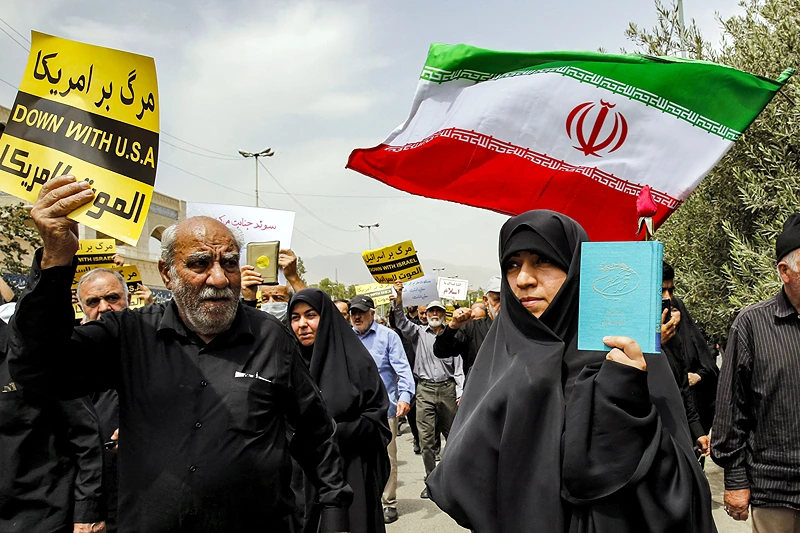

OAN’s Brooke Mallory
3:24 PM – Thursday, August 10, 2023
Five Americans detained in Iran have been placed under house arrest as the first step in a planned prisoner exchange between Tehran and Washington, D.C., that will include the release of roughly $6 billion in Iranian government assets blocked under U.S. sanctions, according to multiple sources with knowledge of the situation
Advertisement
If the proposed deal is approved, Iran will be able to use the cash exclusively to purchase food, medicine, or other humanitarian items, in compliance with existing U.S. sanctions against the nation.
According to the sources, Qatar’s central bank would monitor the cash under the arrangement, which could take weeks to implement.
The new agreement has been negotiated for months, with Qatar and other nations serving as middlemen.
Several of the arrested Americans were transferred from their cells in Tehran’s notorious Evin prison to a location in the city’s capital on Thursday, where they will stay under house arrest until the prisoner exchange takes place.
According to a sources who spoke to the press, one of the Americans was presumably already under house arrest before Thursday. In the past, Americans and other foreign convicts who were about to be released were placed under house arrest before being transferred abroad.
Siamak Namazi, Emad Shargi, and Morad Tahbaz are the three American citizens imprisoned in Iran, according to U.S. authorities. The White House National Security Council also said two more Americans are also imprisoned in Iran, but their families have opted not to identify them publicly.
“We have received confirmation that Iran has released from prison five Americans who were unjustly detained and has placed them on house arrest,” said National Security Council spokesperson Adrienne Watson.
“While this is an encouraging step, these U.S. citizens — Siamak Namazi, Morad Tahbaz, Emad Shargi, and two Americans who at this time wish to remain private — should have never been detained in the first place.”
America “will not rest until they are all back home in the United States,” Watson said.
“Until that time, negotiations for their eventual release remain ongoing and are delicate. We will, therefore, have little in the way of details to provide about the state of their house arrest or about our efforts to secure their freedom,” she added.
An unknown number of permanent legal residents, or green card holders, are being jailed in Iran, including Shahab Dalili, who has been detained since 2016. Only U.S. citizens appear to be involved in the prisoner swap.
“While I hope this will be the first step to their ultimate release, this is at best the beginning of the end and nothing more. But there are simply no guarantees about what happens from here,” said Jared Genser, pro bono counsel for Namazi.
Families of Americans detained in Iran claim their loved ones are being kept as “hostages” on spurious accusations and exploited as negotiating chips by the regime.
Human rights groups claim that Iran has been kidnapping hostages for decades, using foreign detainees as leverage against other nations. However, Iran disputes the accusations and claims that the foreign visitors were treated in conformity with the country’s laws.
Apart from exchanging inmates imprisoned in both nations, the prisoner swap agreement includes the release of around $6 billion blocked in South Korean institutions due to US sanctions.
From 2012 until 2019, Washington, D.C., enabled South Korea and other nations to buy Iranian oil but denied Tehran access to the earnings. Iran could only use the cash for authorized humanitarian purchases. The Iranian regime has long requested access to the funds in exchange for the release of detained Americans.
“This was not an account that was ever intended to be frozen for all time for any purpose. It was always meant to be available for non-sanctionable trade,” said another insider source.
If the funds in South Korea are released, President Joe Biden will almost certainly face a barrage of criticism.
Officials from the administration will most likely argue that the cash may only be used for humanitarian purposes and that it was the only option to guarantee the liberation of the jailed Americans, some of whom had been held for years with little chance of release.
An undetermined number of Iranians arrested in the United States will reportedly be transported from U.S. custody to Iran as part of the swap.
Aside from Qatar, the governments of Oman, the United Arab Emirates, and Iraq acted as mediators in the discussions, according to one of the insiders familiar with the conversations.
Switzerland, which handles U.S. interests in Iran since Washington, D.C., has no diplomatic connections with Tehran, will assist in the implementation of the arrangement, and the Swiss ambassador is likely to have access to the American inmates while they are under house arrest.
Stay informed! Receive breaking news blasts directly to your inbox for free. Subscribe here. https://www.oann.com/alerts





Be the first to comment